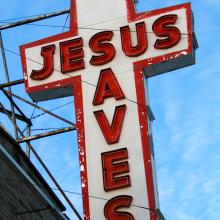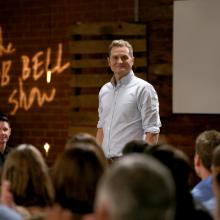evangelicalism
I occupy a strange place between cultures. Not the international cultures of my childhood spent as a missionary kid living around the world, but between two sub-cultures here in modern America. I am a rare breed of evangelical that doesn’t live in a bubble of Christian culture. Quite the opposite. I live and work in higher education, and — mark it — secular higher ed.
An evangelical acquaintance once asked me delicately, “Is there a reason you and your husband don’t work at a Christian university?”
I could hear the gears in his head as he tried to reconcile what he saw before him: two highly educated, devout Christians working in the "liberal bastion" of a secular college. Why on earth would we do such a thing to ourselves?
The truth is, Dwayne and I live and thrive in the place we’ve carved out outside the bubble of American evangelicalism. It’s not that we don’t love the evangelical church, or don’t attend an evangelical congregation.
It’s just that we don’t identify with all aspects of the American version of evangelicalism.
He and I both came to know Jesus outside the States. We are both missionary kids. In addition, Dwayne is Canadian. As a result, we have an outsider’s perspective. For us, living in America and being evangelical poses an interesting paradox.
In so many ways, living and working with people who have vastly different life experiences than our own feels normal. After all, that’s how we grew up — in the company of friends whose worldviews are shaped by the submerged iceberg of cultures not our own. These differences don’t threaten our beliefs. Ironically, holding the space for the lived experiences of our friends creates an environment that also affirms our lived experiences, and more importantly, our faith.
Rachel Held Evans has grown into a powerful voice in American Christianity, first as the author of Evolving in Monkey Town and later with the New York Times best-seller A Year of Biblical Womanhood. Those who follow her writings often note that her thinking has become increasingly progressive, especially on hot-button theological issues such as gender and sexuality. That shift culminated in her leaving evangelicalism for the Episcopal Church.
Next month, Evans will release Searching for Sunday: Loving, Leaving and Finding the Church, a book that oscillates between stinging critiques of American Christianity and prescriptions for how she believes believers can more faithfully participate in church life. In an interview with Religion News Service, she talked about the key to revitalizing the church and defended her exit from evangelicalism. Some answers have been edited for length and clarity.
Q: You say that the way to stop the exodus of millennials from churches isn’t cosmetic changes like better music, sleeker logos, and more relevant programming. Why are these methods ineffective?
A: These aren’t inherently bad strategies, and some churches would be wise to employ them. But many church leaders make the mistake of thinking millennials are shallow consumers who are leaving church because they aren’t being entertained. I think our reasons for leaving church are more complicated, more related to social changes and deep questions of faith than worship style or image.
If you try to woo us back with skinny jeans and coffee shops, it may actually backfire. Millennials have finely tuned B.S. meters that can detect when someone’s just trying to sell us something. We’re not looking for a hipper Christianity. We’re looking for a truer Christianity.
Q: If these aren’t the answer, what is?
On Feb. 21, Time.com broke the news that my evangelical publisher, Destiny Image, dropped a book contract it had made with me almost a year ago because its buyers refused to sell my book due to my pro-LGBTQ activism.
Many conservative evangelicals have called my pro-LGBTQ stance “deplorable” and labeled me a false teacher. Other progressives have uplifted my story as one that demonstrates the discrimination that too many conservative Christians have become known for. In all of this coverage, both positive and negative, though, the true message of my situation has gotten lost.
Sure, my publisher dropped my book contract. Sure, evangelical booksellers seem to have blacklisted me and refuse to sell my evangelical book in evangelical bookstores — a too-close-to-home example of the evangelical discrimination against the LGBTQ community and our allies.
But at the heart of this controversy, there’s a deeper problem: a fundamentally flawed belief that one cannot be a true Christian if one identifies as LGBTQ (or an ally of LGBTQ people).
Rob Bell was once the evangelical It Boy, the hipster pastor with the thick-rimmed glasses and the skinny jeans whose best-selling theology was captured in books with names such as “Velvet Elvis” and “Sex God.”
By 2006, the Chicago Sun-Times wondered aloud whether the Michigan megachurch pastor could be the next Billy Graham.
And then he went to hell.
In 2011, his book “Love Wins” pushed the evangelical envelope on the nature of heaven, hell, and salvation. Many dismissed him as a modern-day heretic, unwilling to embrace traditional evangelicals beliefs about the hereafter.
It used to be that defining an “evangelical” was pretty straightforward: some version of a “born-again” experience, a deep appreciation for the Bible as the written Word of God and a conviction to spread salvation to the masses.
Opposing homosexuality wasn’t part of that holy trinity, but for most evangelicals, it was more or less a given that all sexuality outside of man-woman marriage is sinful. Not so much anymore.
Growing cultural acceptance of homosexuality is leading many Christians to reconsider their historic opposition. As intractable as the debate itself can be, American evangelicals nonetheless are experiencing lively conflicts over maintaining boundaries. What can you believe about gays and still call yourself an evangelical? And who gets to decide?
In October, the Vatican’s Synod on the Family and a major conference of establishment evangelicals in Nashville both featured softer rhetoric on gays and lesbians while reaffirming the view that homosexuality is morally disordered.
Last week in Washington, however, a gay evangelical activist laid out a biblical argument for an affirming view.
Matthew Vines was raised in a conservative Presbyterian congregation in Wichita, Kan. Realizing and accepting that he was gay, Vines neither abandoned religion nor sought out a more affirming church. Instead, he delved deeply into the Bible and Christian teaching. He came away with the conviction that biblical Christianity could affirm same-sex relationships.
Southern Baptist leader Russell Moore has denounced reparative therapy, the controversial idea that people who are gay or have same-sex attraction could become straight.
Joining a chorus of other religious leaders who have departed from a once-popular therapy, some evangelical attempts at reparative therapy have been “severely counterproductive,” Moore told a group of journalists during a press conference at the Ethics and Religious Liberty Commission’s national conference in Nashville on Oct. 28. He also gave similar remarks to the conference of about 1,300 people.
“The utopian idea if you come to Christ and if you go through our program, you’re going to immediately set free from attraction or anything you’re struggling with, I don’t think that’s a Christian idea,” Moore told journalists. “Faithfulness to Christ means obedience to Christ. It does not necessarily mean that someone’s attractions are going to change.”
Moore said evangelicals had an “inadequate view” of what same-sex attraction looks like.
Editor’s Note: ‘Left Behind’ starring Nicolas Cage hits theaters nationwide on Friday, Oct. 3. The film is based on the wildly popular book series and movies of the same title, in which God raptures believers and leaves unbelievers behind to learn follow Jesus and defeat the Antichrist. So how’s the film reboot?
Sojourners Web editors called up a group of religion writers in D.C. to watch and review the movie together. We left with more questions than answers. Here’s our takeaway on all things ‘Left Behind’ — and a little Nic Cage.
Catherine Woodiwiss, Associate Web Editor, Sojourners: So first things first — why Left Behind again?
When the books were published [starting in 1995], there was a debate happening in Christianity over whether Hell was a real, physical place. And the original movies were produced in the context of 9/11 and the Iraq war. So you can look and say, okay, this was a time of questioning what some saw as fundamental beliefs, of war and terrorism. So the popularity of an end-times series makes some sense.
But why now? Why today?
RECENT POLLS SUGGEST that America’s vaunted religiosity is slipping, including the percentage of people willing to identify themselves as evangelicals. At the same time, the percentage of avowed secularists has risen. A movement calling itself the “New Atheism”—those adamantly opposed to religion—has attracted a considerable following.
The oracles of this movement—including Richard Dawkins, Sam Harris, Daniel Dennett, and the late Christopher Hitchens—deny any possibility of the supernatural, assert that religious belief is irrational, and posit that religion has caused untold evil and suffering throughout history. Because of their dogmatism and their refusal to countenance views other than their own, I refer to these people as “secular fundamentalists.”
Hard data may be elusive, but the latest generation of American young people is much less religious than the last, and the growing secularism they represent could be a byproduct of the polarizing effect of the Religious Right. With evangelical fundamentalism being the dominant and most public form of U.S. Christianity over the last generation, young seekers would rather turn away from all religion than adapt to the harsh expression of faith that excludes so many of their peers and often stands against their aspirations for fairness and equality.
Religious fundamentalism has tainted the reputation of Christianity. For many, unbelief has become more palatable than belief, if believing requires an embrace of the distortions that have so characterized U.S. Christianity over the last several decades.
What prompted the emergence of this New Atheism or secular fundamentalism? What historical forces contributed to its rise? The roots of this phenomenon go back more than three decades—to the political mobilization of a different species of fundamentalism that became the movement commonly known as the Religious Right.
I have great respect for religion writer Jonathan Merritt, even though we disagree on a lot of social and theological issues. He evoked a maelstrom about his article suggesting the Arizona law allowing businesses to deny service to LGBTQ people was less than Christian, and yet he stands behind his words.
Basically, many prominent voices from the Baptist and Neo-Calvinist camps went berserk about his call for tolerance; never mind that he didn’t even take on the moral issues surrounding LGBTQ identity itself. It was simply enough that he called for equal treatment of all people as fellow human beings, period. But he broke rank with the conservative Christian rank-and-file, which depends heavily on uniformity of voice and position on key issues.
Merritt took a risk, knowing full well that he’d likely suffer for it. And he did. In a small online forum of fellow religion writers, he expressed dismay both at the aggressive, hateful nature of peoples’ response from the right, as well as the relative palpable silence from the center and left.
For that, to the degree that I can speak for myself and others like me, I’m sorry, Jonathan. When someone steps out like this, putting himself at risk, we should rally to support him, as much as those on the right rally behind causes.
We all know that when it comes to the acceptance of LGBT folks, religions differ. But what the religions communicate, and how the people in the pews actually feel, are not the same.
In a word, the rank and file tend to be more accepting than the leadership. What’s striking is how much this LGBT Gap varies from religion to religion, and we can get some idea of the variance from Pew’s new survey of LGBT Americans.
As the measure of institutional messaging, we will use the percentages of LGBT people who say a given religion is unfriendly to them. These range from 84, 83, 79, and 73 percent for Islam, Mormonism, Catholicism, and Evangelicalism to 47 and 44 percent for Judaism and Mainline Protestantism. Then there is the proportion of members of each religion who believe that “homosexuality should be discouraged by society.” That’s 45, 65, 20, and 59 percent for the first four groups; 15 and 26 percent for the last two.
This is going to be a problem. This chapter on faith and science and quantum mechanics is going to be a problem. Why? Well, because this faith and science thing has been done to death. Did you know that the Vatican has an observatory and that one of the authors of Red Shift Theory was a Jesuit? Yep. The famed Scopes Monkey Trial was more than a century ago and those of us in the Protestant Mainline have long ago made peace with it. The Vatican apologized for the oppression of scientists, most specifically it said that Galileo was right. Scientific inquiry and Biblical interpretation are not the same thing. So what's Rob's purpose for this chapter?
Well, it's manifold. He's an evangelical. He's writing in some ways to other evangelicals, specifically those who have felt cut off from the tradition. Here in the States, the classic evangelical line holds echoes of the arguments used during the Scopes Monkey Trial. Some in that Christian tradition are still fighting that fight. Heck, some progressives are, too. Powerful (if false) dichotomies have been established.

Prince of Peace Abbey, Oceanside, Calif. Photo by Randy OHC/Wylio http://bit.ly/wFY3hy
As a person who (loosely) identifies with the evangelical tradition, allow me to make a clear, unambiguous, declaration: GOD IS PRO-PEACE!
You may be thinking, “Just how exactly does a guy who claims to believe in the inspiration of Scripture arrive at the conclusion that God is pro-peace? Has this guy even read the Bible? Maybe he’s one of those amnesia-type Christians, the ones who read through the Bible every year as part of their daily devotions, and every time they get to the slavery and genocide passages, their mind goes ______________.
Maybe it wasn't those exact words, but whatever you were thinking, believe me, I get it!
The “E Word” in Christianity is a funny thing.
In one respect, Evangelicals are self-identified, and therefore, self-defined. On the other, popular culture (particularly media) lays its own meaning on what it means to be Evangelical. In the latter context, the word inevitably translates to “Conservative Christian.”
But I think this definition isn’t fair. What’s more, it’s not accurate.
I’m a self-proclaimed “word nerd,” so I tend to turn to etymology for help. The root meaning of “evangelical,” at least as a paraphrase, means “to tell the good news.”
Sufficiently vague, right? Depends on who you ask.
Every so often, evangelicals get the urge to ex-communicate. Feminists, open theists, and universalists have all drawn the ire of their co-religionists. In the absence of a central religious authority, such efforts are doomed to fail.
According to most scholars, evangelicalism is more of a network than a unified church. Magazines, publishing houses, colleges, and parachurch groups play a bigger role than ecclesial bodies. While condemned from many pulpits, the emerging church continues to publish with Zondervan and Baker. Owned by the same company as Zondervan and Fox News (Rupert Murdoch’s News Corporation), HarperOne has provided a home for Rob Bell and his Love Wins.
Though it hasn’t been easy, Bell has remained a part of American evangelicalism.
Fried by their battles with fellow believers, some have decided to ex-communicate themselves. Even then it is hard to cut the tie. As in the case of cultural Catholicism, religious terminology may haunt a post-evangelical’s speech. Commenting on this phenomenon, Tony Jones wonders whether evangelicalism is the “new Jewish" — more cultural than confessional.
A California vicar I know likes to describe the life of faith — the Church — as “The Great Conversation.” It is a conversation to which we all (and what part of alldon’t you understand?) are invited. When followers of Christ share their faith with others, they are inviting them to join the sacred conversation.
This is evangelicalism in its truest sense. This is what we are called to do. By the One, by Emmanuel, “God with us.”
My dear friend, (and most recently my boss), Sojourners CEO Jim Wallis, said recently that the 2012 presidential election is expected to be the most mean-spirited and vitriolic we’ve ever seen.
That may be true, but it doesn’t necessarily mean it must be that way.
We can solve that problem one conversation at a time.












